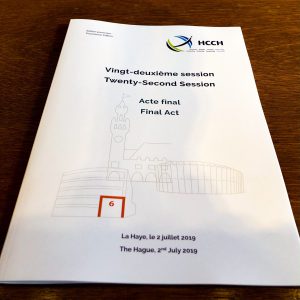Service of Process abroad: Lost in Translation
Written by Benedikt Windau
Benedikt Windau, Judge at the Oldenburg District Court (Landgericht Oldenburg), runs a very interesting blog (in German), focusing on German Civil Procedure. In one of his recent postings, he presented a very interesting judgment of the Frankfurt CoA, related to the Service Regulation. Upon my request, he prepared an English version of his post for our blog.
A recent ruling of the Frankfurt Court of Appeals (Docket No. 13 U 210/17) will potentially shake up the (German) law of cross-border service quite a bit, as it imposes new, hence unknown obligations on the plaintiff – and its legal counsel accordingly.
THE FACTS
The plaintiff, a German insolvency administrator, sued the defendant, who is located in France, before the Darmstadt district court (Landgericht). The statement of claim arrived at the court on December 15, 2015; the period of limitation ended on December 31, 2015 (at least that is what the district court and the court of appeals assumed).
In the statement of claim he asked for it to be translated by the court on his costs into French before being served upon the defendant. Yet the court could not find a translator for quite a period of time (yes, that French quite frequently spoken in the EU…) and thus the statement of claim was not translated before October 24, 2016. It was finally served on December 9, 2016.
German law provides, that the limitation period is suspended by inter alia the bringing of an action for performance (Sec. 204 (1) No. 1 German Civil Code). It furthermore provides that if service is made in order to have the period of limitations suspended in this respect, the receipt of the corresponding application or declaration by the court shall already have this effect provided service is made “demnächst” (Sec. 167 Code of Civil Procedure). “Demnächst” (which means something like “soon” or “in the near future”), in this respect is roughly understood as “not with undue delay caused by the plaintiff”.
The district court considered the service to be “demnächst”, as the court, not the plaintiff was to be blamed for the delay. It thus held that the service in December 2016 suspended the period of limitations despite the fact that almost a year passed between the ending of the period of limitation and the service.
THE RULING
On the defendant’s appeal, the Frankfurt Court of Appeal held that the period of limitations was not suspended retroactively and thus dismissed the claim.
It first discusses whether there is an absolute time limit to “demnächst” that might have been exceeded in this case. But according to the court, this need not be decided, as there was undue delay caused by the plaintiff.
The court states, that under the Service Regulation (Regulation (EC) No. 1393/2007) documents do not have to be translated before being served. Without translation the addressee is protected by its right to refuse acceptance of the document (Art. 5, 8 Service Regulation). Furthermore, a translation under the Service Regulation need not comply with any requirements regarding its form and thus could be provided by the parties.
It then argues that according to Art. 5 (1) Service Regulation it had been upon the plaintiff to decide whether the statement of claim would be translated prior to service. So, if the plaintiff here chose the statement of claim to be translated, it would have been upon him to provide a translation along with the statement of claim. Had he done so, the statement would probably have been served within six weeks, thus not later than February 2016. Under these circumstances, the service in December 2016 could not be seen as “demnächst”.
COMMENTS
1. The Court of Appeals is absolutely right in stating the obvious (but widely quite unknown), that a) documents do not have to be translated under the Service Regulation, and b) the translation can be provided by the plaintiff as there is no certain form required (just as under the Hague Service Convention).
The defendant is sufficiently protected by his right to refuse acceptance of service (Art. 8 Service Regulation) – and by Art. 45 (1) lit. (b) of the Brussels I bis Regulation, if the quality of the translation is insufficient.
2. Thus the plaintiff could (and maybe should) have chosen the statement of claims to be served without translation in the first place, which would have been faster and probably cheaper. Had the defendant then refused to accept the service, he could still have provided a translation (or asked the court to provide a translation) and this service would still have suspended the period of limitations (see Art. 8 (3) Service Regulation). Alternatively, he could have proven that the defendant does in fact understand the language of the document and therefore the refusal of acceptance was without justification. That would make the statement of claim deemed to be served under German Law (see Sec. 179 Code of Civil Procedure).
3. However I’m not convinced, that under German Law a plaintiff is obliged to provide a translation himself for purposes of cross-border-service, even more so without an explicit request by the court (cf. Sec. 139 Code of Civil Procedure). Such an obligation is neither provided for in the ZRHO (“Rechtshilfeordnung für Zivilsachen”, the German administrative regulation governing inter alia cross-border-service), nor can such an obligation be found in the Service Regulation, especially in light of the wording in Art. 5 (2).
4. Plaintiffs’ counsel will now often find themselves “lost in translation”: On the one hand the Frankfurt Court of Appeals‘ judgment requires the parties to provide translations themselves. On the other hand, the parties‘ right to provide translations themselves may be unkonwn to some courts and therefore require some discussions. A little help in these discussions may be an article by Dr. Philine Fabig (and myself) in the Neue Juristische Wochenschrift (NJW 2017, 2502 et seq.).
OUTLOOK
The only good news is that the plaintiff appealed the judgement; the case is now pending before the Federal Court of Justice (Bundesgerichtshof) under Docket-No. IX ZR 156/19. So maybe the Bundesgerichtshof will find some final and fog-lifting words on the subject.

